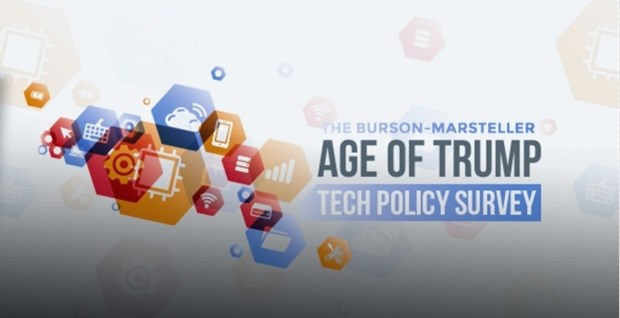The survey reveals that 76% of technology elites say the US technology industry’s best days are still to come compared to 59% of the public and 59% of technology elites believe the incoming Trump administration will be favourable to the technology industry, compared to 50% of the public.
Participants in the survey included 1,000 members of the US public, as well as a separate sample of 500 technology elites, individuals who either work in technology or invest in the technology sector. PSB conducted the research on behalf of Burson-Marsteller from 6-13 December 2016.

Continuing in this vein, 73% of technology elites believe the technology industry will contribute to job creation, compared to 63% of the public, and 73% of technology elites say that innovation is critical to the US’ position in the global economy and the technology industry is going in the right direction to maintain that, compared to 59% of the public.
Overall, 52% of technology elites believe the country is going in the right direction compared to 27% of the public and 59% say the economy will improve under President Trump compared to 46% of the public. In addition, 88% of technology elites and 76% of the public trust the technology industry to behave responsibly and in the best interests of the American public.
In contrast to the optimism among technology elites about the current and future state of the economy, the public expressed some concerns, with 59% believing the country is on the wrong track. Furthermore, less than half of the public (43%) believe the economy is better off than it was four years ago, with only one in five indicating it will be significantly better five years from now.
While both technology elites and the public believe the technology industry will do better in the next four years (56% and 66%, respectively), they are less sure about Donald Trump’s role in that success. Only 50% of the public say “yes” when asked if Trump is a technology industry supporter, and this is only slightly higher among technology elites at 59%.
Technology elites are evenly split on whether the Trump or Obama administrations understand the needs of companies in the industry better, although the public is slightly more likely to favour the Trump administration at 58%. When asked to choose the word that best describes how they feel about the future of the industry under the Trump administration, 37% of technology elites choose positive words (optimistic, energised, supported, eager), 34% choose negative words (concerned, anxious, attacked, angry), and 27% choose neutral words (wait and see, neutral, so-so/mixed feelings). The public was even more ambivalent about Trump’s impact on the future of the technology industry, with a plurality (39%) choosing neutral words, 33% choosing positive words and 27% choosing negative words.
• The public is also more likely to say that, for the average American, technology is a job destroyer (37% vs. 27% of technology elites) and that innovation negatively affects average American jobs (35% vs. 22%).
• The public is more likely than technology elites to agree that traditional manufacturing and service jobs are more important for the economy than expanding innovation (74% vs. 68%).“This new survey reveals intriguing insights into the beliefs of those closest to the technology industry, compared to the public and are especially relevant now right before the inauguration and during CES, the most important technology gathering of the year,” said Don Baer, worldwide chair and CEO, Burson-Marsteller. “Interestingly, the findings suggest those in the technology industry are very optimistic about the industry’s direction and prospects for the next four years, even though they are less sure of the impact of the incoming Trump administration on it.”
• Technology elites are most likely to say that China (57%) and Japan (46%) are the countries most likely to surpass the US in terms of technology success.
• Technology elites have concerns about security and privacy, which are driven by their belief that the Trump administration may not do enough to protect consumers. Key for technology elites is the security of corporate data (30%), security of government data (27%) and protection of consumer privacy (25%). The public’s concerns are similar, responding that the top priorities should be security of government data (43%), hacking and ransomware (40%) and protecting consumer privacy (38%).
• Technology elites and public respondents say that high-skills job training (72% and 67%, respectively) and increased science, technology, engineering and mathematics (STEM) education (59% and 53%, respectively) are the best steps to spread the benefits of American innovation to a broader portion of the American public.
For more information, click here.